Analyzing Sociocultural Factors Impacting International Students
VerifiedAdded on 2023/06/04
|19
|4167
|291
Report
AI Summary
This report investigates the sociocultural challenges faced by international students in Australia, focusing on factors beyond academics such as language barriers, social integration, cultural norms, and homesickness. It uses a mixed-methods approach to examine the experiences and perceptions of international students across six different locations in Australia over four years. The study aims to identify specific sociocultural factors impacting these students and to propose solutions for the Australian education sector to better support them. The research addresses the need for a deeper understanding of these challenges to enhance the international student experience, considering the increasing number of students choosing Australia for higher education and the diverse cultural backgrounds they represent. Ultimately, the findings seek to improve student well-being and academic success by mitigating the negative effects of culture shock and promoting a more inclusive educational environment.
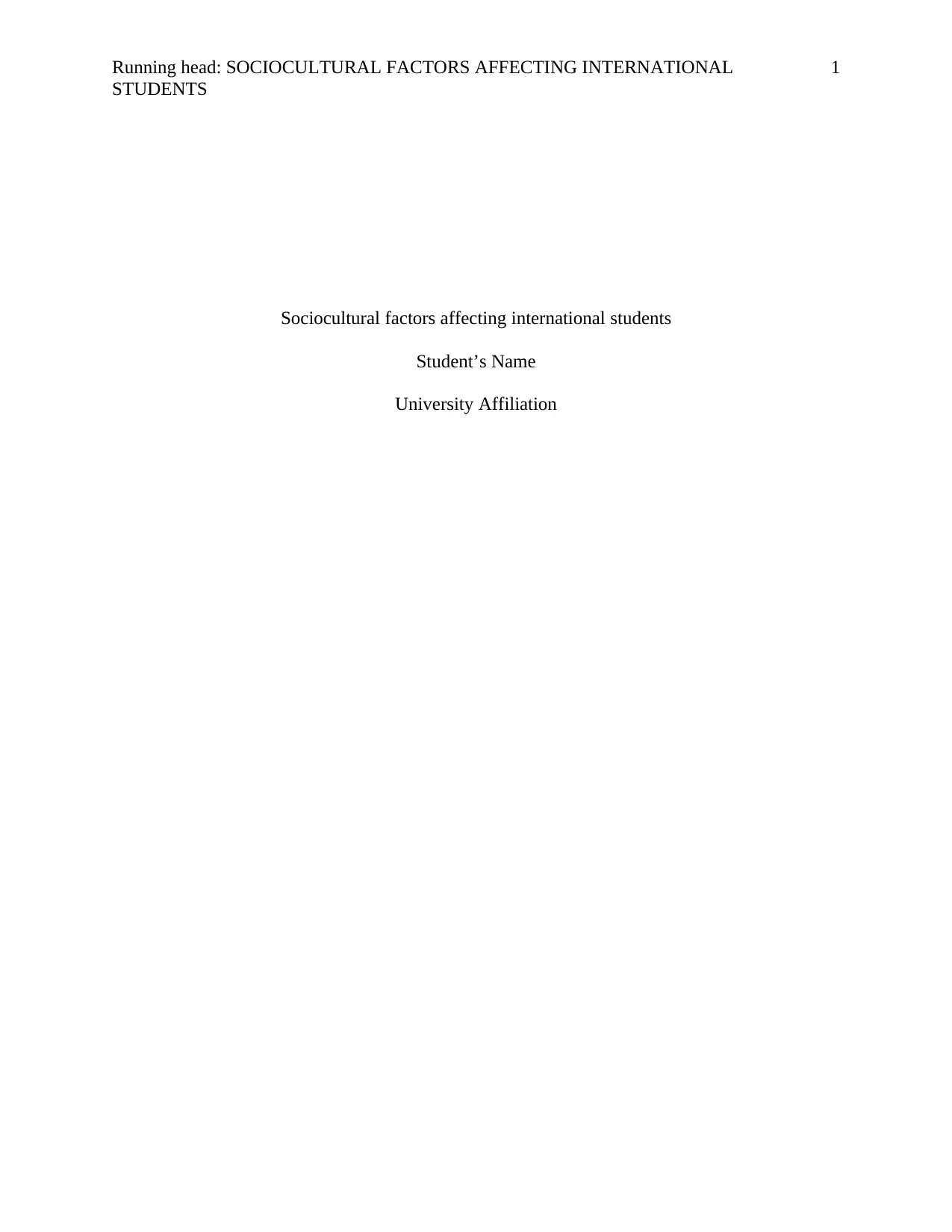
Running head: SOCIOCULTURAL FACTORS AFFECTING INTERNATIONAL
STUDENTS
1
Sociocultural factors affecting international students
Student’s Name
University Affiliation
STUDENTS
1
Sociocultural factors affecting international students
Student’s Name
University Affiliation
Paraphrase This Document
Need a fresh take? Get an instant paraphrase of this document with our AI Paraphraser
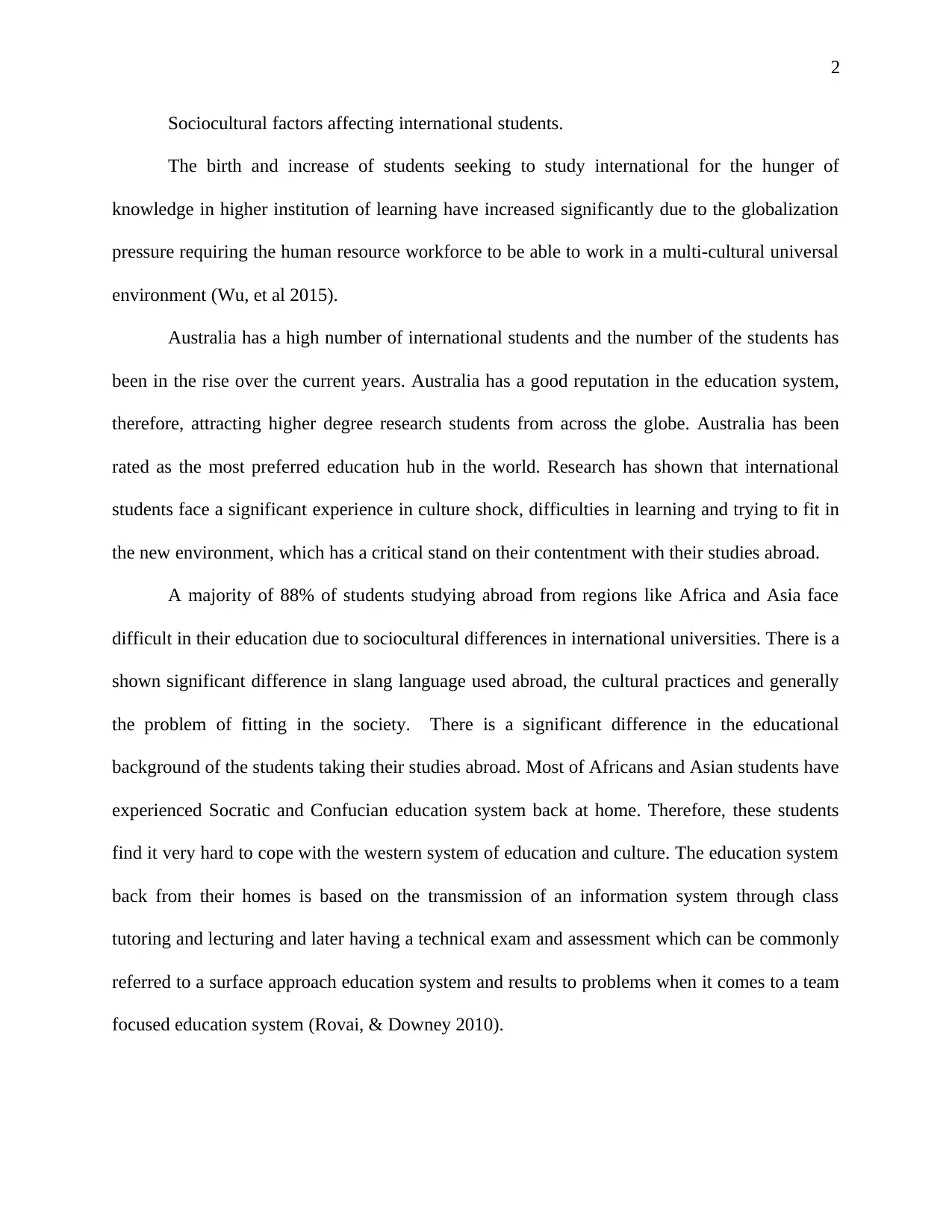
2
Sociocultural factors affecting international students.
The birth and increase of students seeking to study international for the hunger of
knowledge in higher institution of learning have increased significantly due to the globalization
pressure requiring the human resource workforce to be able to work in a multi-cultural universal
environment (Wu, et al 2015).
Australia has a high number of international students and the number of the students has
been in the rise over the current years. Australia has a good reputation in the education system,
therefore, attracting higher degree research students from across the globe. Australia has been
rated as the most preferred education hub in the world. Research has shown that international
students face a significant experience in culture shock, difficulties in learning and trying to fit in
the new environment, which has a critical stand on their contentment with their studies abroad.
A majority of 88% of students studying abroad from regions like Africa and Asia face
difficult in their education due to sociocultural differences in international universities. There is a
shown significant difference in slang language used abroad, the cultural practices and generally
the problem of fitting in the society. There is a significant difference in the educational
background of the students taking their studies abroad. Most of Africans and Asian students have
experienced Socratic and Confucian education system back at home. Therefore, these students
find it very hard to cope with the western system of education and culture. The education system
back from their homes is based on the transmission of an information system through class
tutoring and lecturing and later having a technical exam and assessment which can be commonly
referred to a surface approach education system and results to problems when it comes to a team
focused education system (Rovai, & Downey 2010).
Sociocultural factors affecting international students.
The birth and increase of students seeking to study international for the hunger of
knowledge in higher institution of learning have increased significantly due to the globalization
pressure requiring the human resource workforce to be able to work in a multi-cultural universal
environment (Wu, et al 2015).
Australia has a high number of international students and the number of the students has
been in the rise over the current years. Australia has a good reputation in the education system,
therefore, attracting higher degree research students from across the globe. Australia has been
rated as the most preferred education hub in the world. Research has shown that international
students face a significant experience in culture shock, difficulties in learning and trying to fit in
the new environment, which has a critical stand on their contentment with their studies abroad.
A majority of 88% of students studying abroad from regions like Africa and Asia face
difficult in their education due to sociocultural differences in international universities. There is a
shown significant difference in slang language used abroad, the cultural practices and generally
the problem of fitting in the society. There is a significant difference in the educational
background of the students taking their studies abroad. Most of Africans and Asian students have
experienced Socratic and Confucian education system back at home. Therefore, these students
find it very hard to cope with the western system of education and culture. The education system
back from their homes is based on the transmission of an information system through class
tutoring and lecturing and later having a technical exam and assessment which can be commonly
referred to a surface approach education system and results to problems when it comes to a team
focused education system (Rovai, & Downey 2010).
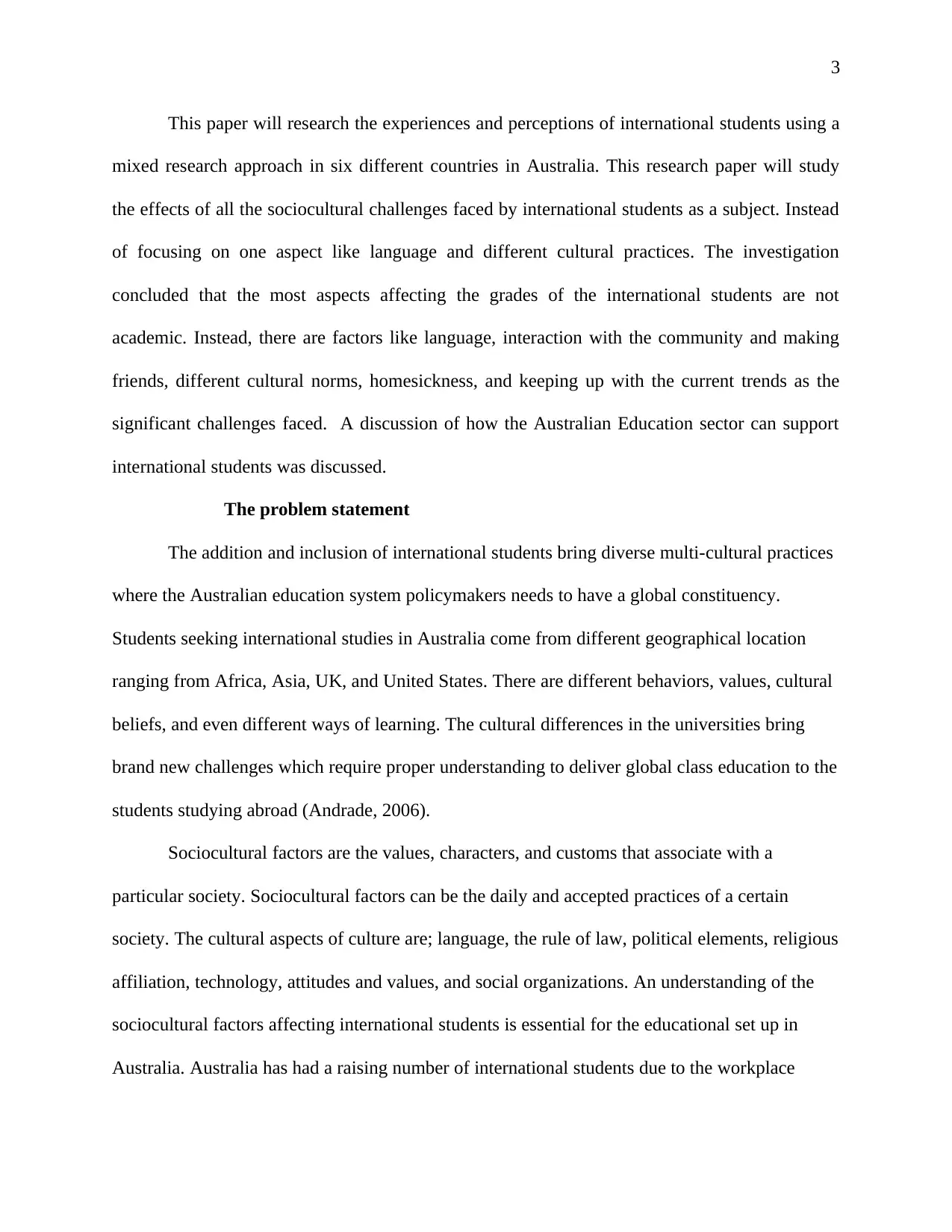
3
This paper will research the experiences and perceptions of international students using a
mixed research approach in six different countries in Australia. This research paper will study
the effects of all the sociocultural challenges faced by international students as a subject. Instead
of focusing on one aspect like language and different cultural practices. The investigation
concluded that the most aspects affecting the grades of the international students are not
academic. Instead, there are factors like language, interaction with the community and making
friends, different cultural norms, homesickness, and keeping up with the current trends as the
significant challenges faced. A discussion of how the Australian Education sector can support
international students was discussed.
The problem statement
The addition and inclusion of international students bring diverse multi-cultural practices
where the Australian education system policymakers needs to have a global constituency.
Students seeking international studies in Australia come from different geographical location
ranging from Africa, Asia, UK, and United States. There are different behaviors, values, cultural
beliefs, and even different ways of learning. The cultural differences in the universities bring
brand new challenges which require proper understanding to deliver global class education to the
students studying abroad (Andrade, 2006).
Sociocultural factors are the values, characters, and customs that associate with a
particular society. Sociocultural factors can be the daily and accepted practices of a certain
society. The cultural aspects of culture are; language, the rule of law, political elements, religious
affiliation, technology, attitudes and values, and social organizations. An understanding of the
sociocultural factors affecting international students is essential for the educational set up in
Australia. Australia has had a raising number of international students due to the workplace
This paper will research the experiences and perceptions of international students using a
mixed research approach in six different countries in Australia. This research paper will study
the effects of all the sociocultural challenges faced by international students as a subject. Instead
of focusing on one aspect like language and different cultural practices. The investigation
concluded that the most aspects affecting the grades of the international students are not
academic. Instead, there are factors like language, interaction with the community and making
friends, different cultural norms, homesickness, and keeping up with the current trends as the
significant challenges faced. A discussion of how the Australian Education sector can support
international students was discussed.
The problem statement
The addition and inclusion of international students bring diverse multi-cultural practices
where the Australian education system policymakers needs to have a global constituency.
Students seeking international studies in Australia come from different geographical location
ranging from Africa, Asia, UK, and United States. There are different behaviors, values, cultural
beliefs, and even different ways of learning. The cultural differences in the universities bring
brand new challenges which require proper understanding to deliver global class education to the
students studying abroad (Andrade, 2006).
Sociocultural factors are the values, characters, and customs that associate with a
particular society. Sociocultural factors can be the daily and accepted practices of a certain
society. The cultural aspects of culture are; language, the rule of law, political elements, religious
affiliation, technology, attitudes and values, and social organizations. An understanding of the
sociocultural factors affecting international students is essential for the educational set up in
Australia. Australia has had a raising number of international students due to the workplace
⊘ This is a preview!⊘
Do you want full access?
Subscribe today to unlock all pages.

Trusted by 1+ million students worldwide
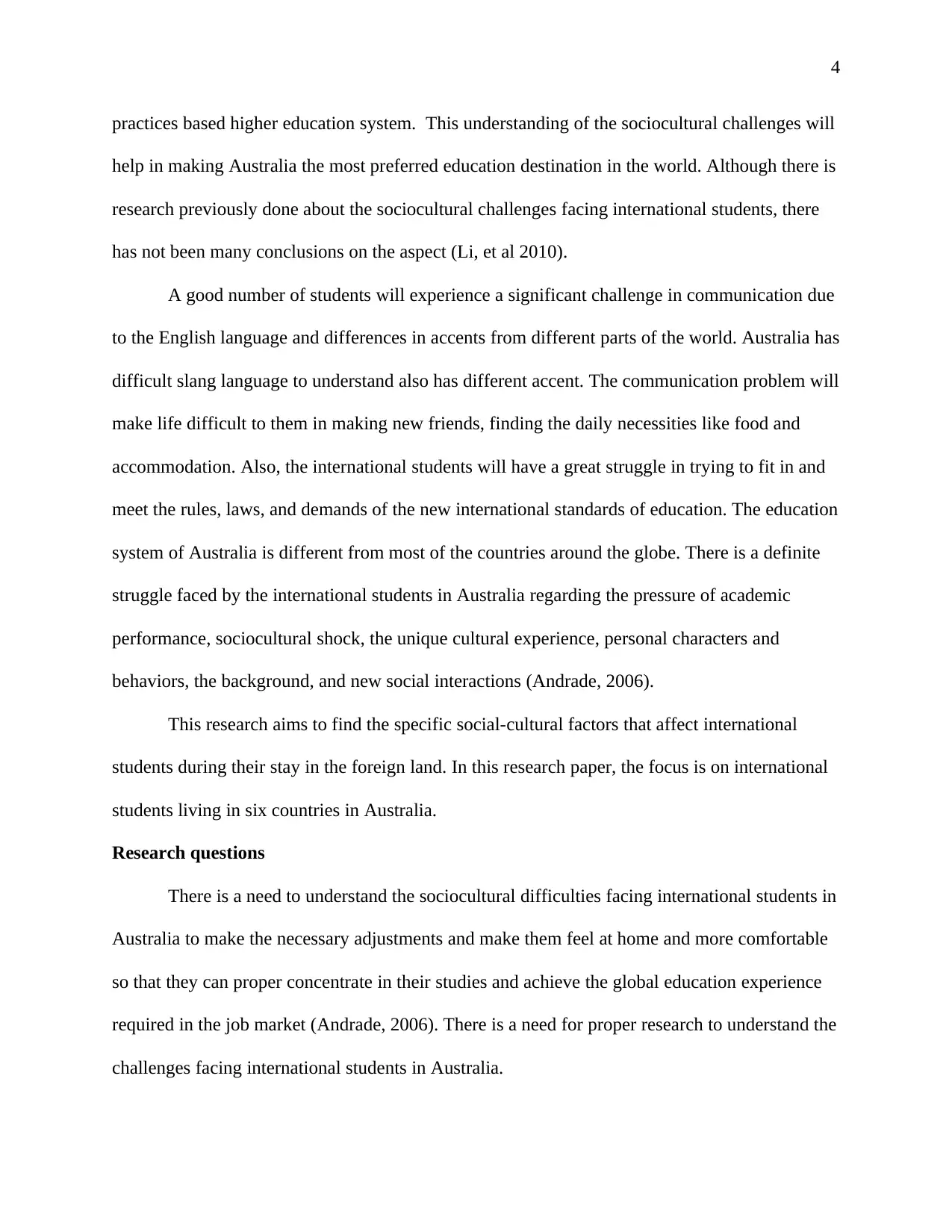
4
practices based higher education system. This understanding of the sociocultural challenges will
help in making Australia the most preferred education destination in the world. Although there is
research previously done about the sociocultural challenges facing international students, there
has not been many conclusions on the aspect (Li, et al 2010).
A good number of students will experience a significant challenge in communication due
to the English language and differences in accents from different parts of the world. Australia has
difficult slang language to understand also has different accent. The communication problem will
make life difficult to them in making new friends, finding the daily necessities like food and
accommodation. Also, the international students will have a great struggle in trying to fit in and
meet the rules, laws, and demands of the new international standards of education. The education
system of Australia is different from most of the countries around the globe. There is a definite
struggle faced by the international students in Australia regarding the pressure of academic
performance, sociocultural shock, the unique cultural experience, personal characters and
behaviors, the background, and new social interactions (Andrade, 2006).
This research aims to find the specific social-cultural factors that affect international
students during their stay in the foreign land. In this research paper, the focus is on international
students living in six countries in Australia.
Research questions
There is a need to understand the sociocultural difficulties facing international students in
Australia to make the necessary adjustments and make them feel at home and more comfortable
so that they can proper concentrate in their studies and achieve the global education experience
required in the job market (Andrade, 2006). There is a need for proper research to understand the
challenges facing international students in Australia.
practices based higher education system. This understanding of the sociocultural challenges will
help in making Australia the most preferred education destination in the world. Although there is
research previously done about the sociocultural challenges facing international students, there
has not been many conclusions on the aspect (Li, et al 2010).
A good number of students will experience a significant challenge in communication due
to the English language and differences in accents from different parts of the world. Australia has
difficult slang language to understand also has different accent. The communication problem will
make life difficult to them in making new friends, finding the daily necessities like food and
accommodation. Also, the international students will have a great struggle in trying to fit in and
meet the rules, laws, and demands of the new international standards of education. The education
system of Australia is different from most of the countries around the globe. There is a definite
struggle faced by the international students in Australia regarding the pressure of academic
performance, sociocultural shock, the unique cultural experience, personal characters and
behaviors, the background, and new social interactions (Andrade, 2006).
This research aims to find the specific social-cultural factors that affect international
students during their stay in the foreign land. In this research paper, the focus is on international
students living in six countries in Australia.
Research questions
There is a need to understand the sociocultural difficulties facing international students in
Australia to make the necessary adjustments and make them feel at home and more comfortable
so that they can proper concentrate in their studies and achieve the global education experience
required in the job market (Andrade, 2006). There is a need for proper research to understand the
challenges facing international students in Australia.
Paraphrase This Document
Need a fresh take? Get an instant paraphrase of this document with our AI Paraphraser
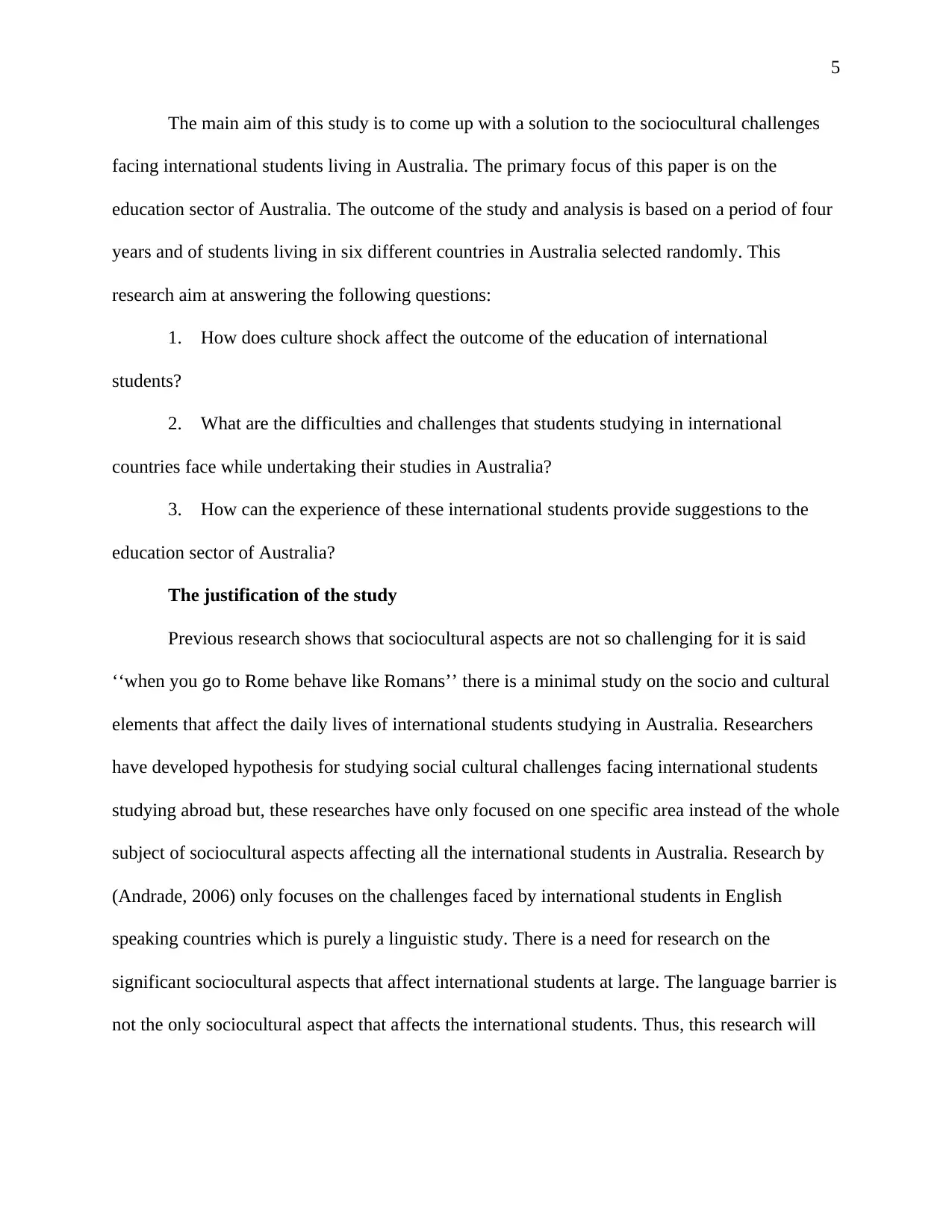
5
The main aim of this study is to come up with a solution to the sociocultural challenges
facing international students living in Australia. The primary focus of this paper is on the
education sector of Australia. The outcome of the study and analysis is based on a period of four
years and of students living in six different countries in Australia selected randomly. This
research aim at answering the following questions:
1. How does culture shock affect the outcome of the education of international
students?
2. What are the difficulties and challenges that students studying in international
countries face while undertaking their studies in Australia?
3. How can the experience of these international students provide suggestions to the
education sector of Australia?
The justification of the study
Previous research shows that sociocultural aspects are not so challenging for it is said
‘‘when you go to Rome behave like Romans’’ there is a minimal study on the socio and cultural
elements that affect the daily lives of international students studying in Australia. Researchers
have developed hypothesis for studying social cultural challenges facing international students
studying abroad but, these researches have only focused on one specific area instead of the whole
subject of sociocultural aspects affecting all the international students in Australia. Research by
(Andrade, 2006) only focuses on the challenges faced by international students in English
speaking countries which is purely a linguistic study. There is a need for research on the
significant sociocultural aspects that affect international students at large. The language barrier is
not the only sociocultural aspect that affects the international students. Thus, this research will
The main aim of this study is to come up with a solution to the sociocultural challenges
facing international students living in Australia. The primary focus of this paper is on the
education sector of Australia. The outcome of the study and analysis is based on a period of four
years and of students living in six different countries in Australia selected randomly. This
research aim at answering the following questions:
1. How does culture shock affect the outcome of the education of international
students?
2. What are the difficulties and challenges that students studying in international
countries face while undertaking their studies in Australia?
3. How can the experience of these international students provide suggestions to the
education sector of Australia?
The justification of the study
Previous research shows that sociocultural aspects are not so challenging for it is said
‘‘when you go to Rome behave like Romans’’ there is a minimal study on the socio and cultural
elements that affect the daily lives of international students studying in Australia. Researchers
have developed hypothesis for studying social cultural challenges facing international students
studying abroad but, these researches have only focused on one specific area instead of the whole
subject of sociocultural aspects affecting all the international students in Australia. Research by
(Andrade, 2006) only focuses on the challenges faced by international students in English
speaking countries which is purely a linguistic study. There is a need for research on the
significant sociocultural aspects that affect international students at large. The language barrier is
not the only sociocultural aspect that affects the international students. Thus, this research will
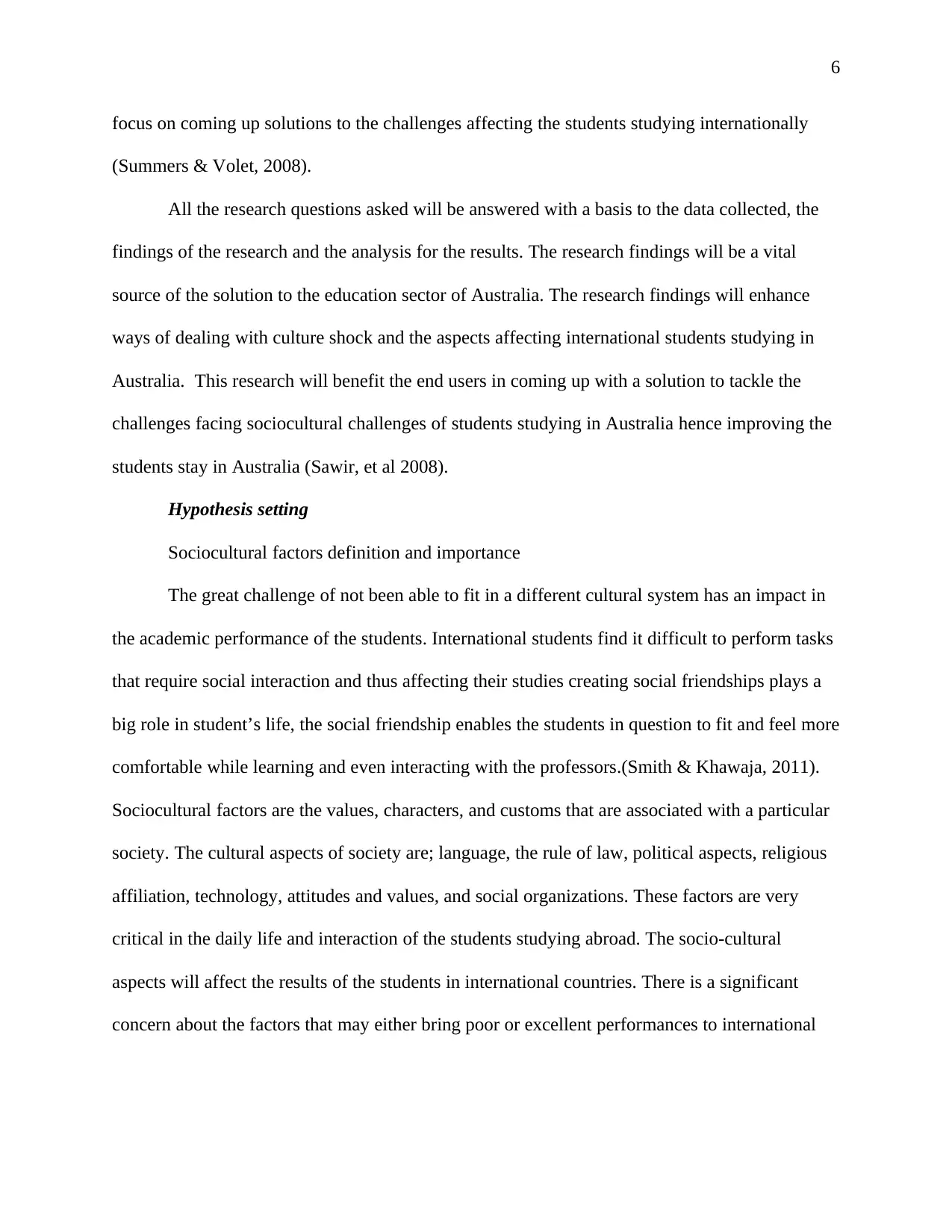
6
focus on coming up solutions to the challenges affecting the students studying internationally
(Summers & Volet, 2008).
All the research questions asked will be answered with a basis to the data collected, the
findings of the research and the analysis for the results. The research findings will be a vital
source of the solution to the education sector of Australia. The research findings will enhance
ways of dealing with culture shock and the aspects affecting international students studying in
Australia. This research will benefit the end users in coming up with a solution to tackle the
challenges facing sociocultural challenges of students studying in Australia hence improving the
students stay in Australia (Sawir, et al 2008).
Hypothesis setting
Sociocultural factors definition and importance
The great challenge of not been able to fit in a different cultural system has an impact in
the academic performance of the students. International students find it difficult to perform tasks
that require social interaction and thus affecting their studies creating social friendships plays a
big role in student’s life, the social friendship enables the students in question to fit and feel more
comfortable while learning and even interacting with the professors.(Smith & Khawaja, 2011).
Sociocultural factors are the values, characters, and customs that are associated with a particular
society. The cultural aspects of society are; language, the rule of law, political aspects, religious
affiliation, technology, attitudes and values, and social organizations. These factors are very
critical in the daily life and interaction of the students studying abroad. The socio-cultural
aspects will affect the results of the students in international countries. There is a significant
concern about the factors that may either bring poor or excellent performances to international
focus on coming up solutions to the challenges affecting the students studying internationally
(Summers & Volet, 2008).
All the research questions asked will be answered with a basis to the data collected, the
findings of the research and the analysis for the results. The research findings will be a vital
source of the solution to the education sector of Australia. The research findings will enhance
ways of dealing with culture shock and the aspects affecting international students studying in
Australia. This research will benefit the end users in coming up with a solution to tackle the
challenges facing sociocultural challenges of students studying in Australia hence improving the
students stay in Australia (Sawir, et al 2008).
Hypothesis setting
Sociocultural factors definition and importance
The great challenge of not been able to fit in a different cultural system has an impact in
the academic performance of the students. International students find it difficult to perform tasks
that require social interaction and thus affecting their studies creating social friendships plays a
big role in student’s life, the social friendship enables the students in question to fit and feel more
comfortable while learning and even interacting with the professors.(Smith & Khawaja, 2011).
Sociocultural factors are the values, characters, and customs that are associated with a particular
society. The cultural aspects of society are; language, the rule of law, political aspects, religious
affiliation, technology, attitudes and values, and social organizations. These factors are very
critical in the daily life and interaction of the students studying abroad. The socio-cultural
aspects will affect the results of the students in international countries. There is a significant
concern about the factors that may either bring poor or excellent performances to international
⊘ This is a preview!⊘
Do you want full access?
Subscribe today to unlock all pages.

Trusted by 1+ million students worldwide
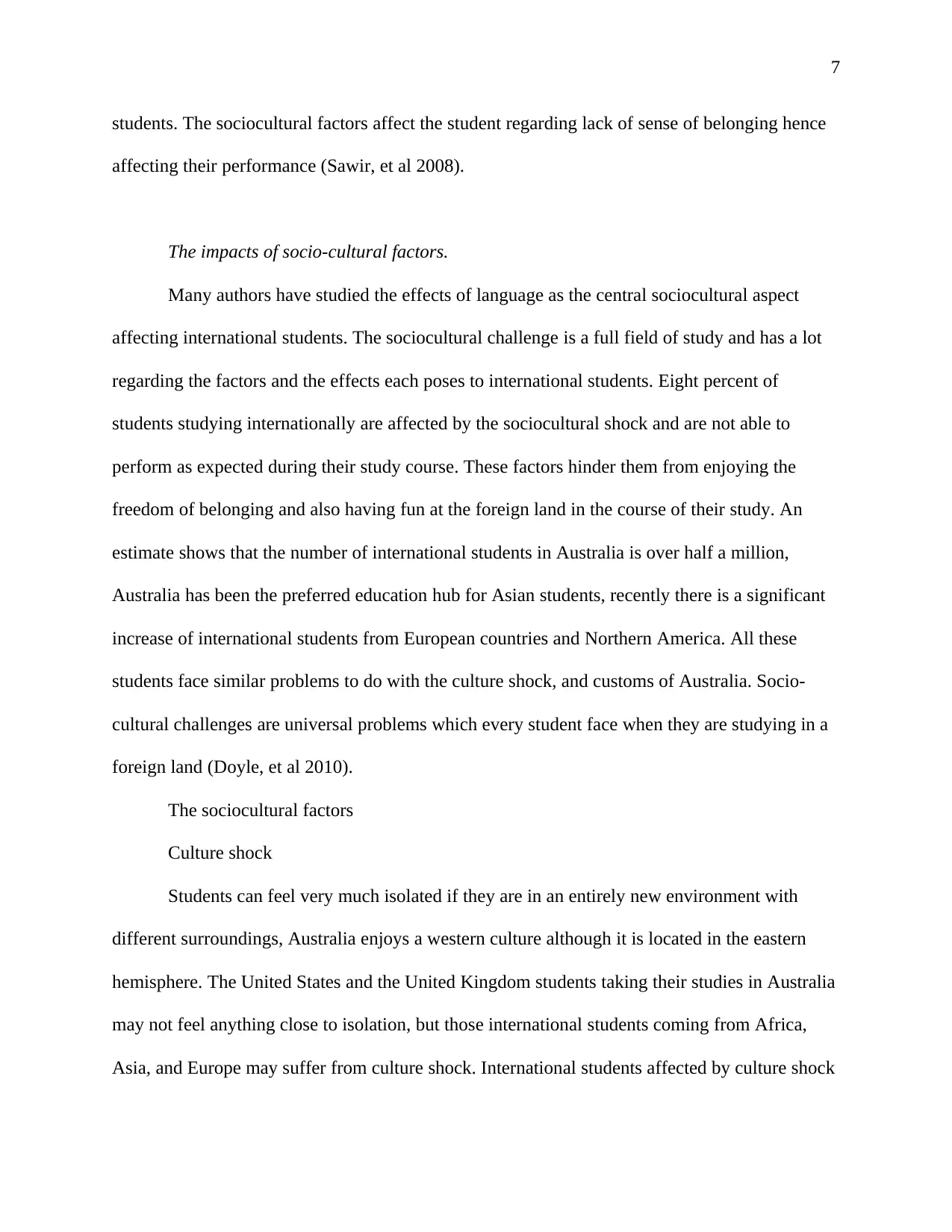
7
students. The sociocultural factors affect the student regarding lack of sense of belonging hence
affecting their performance (Sawir, et al 2008).
The impacts of socio-cultural factors.
Many authors have studied the effects of language as the central sociocultural aspect
affecting international students. The sociocultural challenge is a full field of study and has a lot
regarding the factors and the effects each poses to international students. Eight percent of
students studying internationally are affected by the sociocultural shock and are not able to
perform as expected during their study course. These factors hinder them from enjoying the
freedom of belonging and also having fun at the foreign land in the course of their study. An
estimate shows that the number of international students in Australia is over half a million,
Australia has been the preferred education hub for Asian students, recently there is a significant
increase of international students from European countries and Northern America. All these
students face similar problems to do with the culture shock, and customs of Australia. Socio-
cultural challenges are universal problems which every student face when they are studying in a
foreign land (Doyle, et al 2010).
The sociocultural factors
Culture shock
Students can feel very much isolated if they are in an entirely new environment with
different surroundings, Australia enjoys a western culture although it is located in the eastern
hemisphere. The United States and the United Kingdom students taking their studies in Australia
may not feel anything close to isolation, but those international students coming from Africa,
Asia, and Europe may suffer from culture shock. International students affected by culture shock
students. The sociocultural factors affect the student regarding lack of sense of belonging hence
affecting their performance (Sawir, et al 2008).
The impacts of socio-cultural factors.
Many authors have studied the effects of language as the central sociocultural aspect
affecting international students. The sociocultural challenge is a full field of study and has a lot
regarding the factors and the effects each poses to international students. Eight percent of
students studying internationally are affected by the sociocultural shock and are not able to
perform as expected during their study course. These factors hinder them from enjoying the
freedom of belonging and also having fun at the foreign land in the course of their study. An
estimate shows that the number of international students in Australia is over half a million,
Australia has been the preferred education hub for Asian students, recently there is a significant
increase of international students from European countries and Northern America. All these
students face similar problems to do with the culture shock, and customs of Australia. Socio-
cultural challenges are universal problems which every student face when they are studying in a
foreign land (Doyle, et al 2010).
The sociocultural factors
Culture shock
Students can feel very much isolated if they are in an entirely new environment with
different surroundings, Australia enjoys a western culture although it is located in the eastern
hemisphere. The United States and the United Kingdom students taking their studies in Australia
may not feel anything close to isolation, but those international students coming from Africa,
Asia, and Europe may suffer from culture shock. International students affected by culture shock
Paraphrase This Document
Need a fresh take? Get an instant paraphrase of this document with our AI Paraphraser
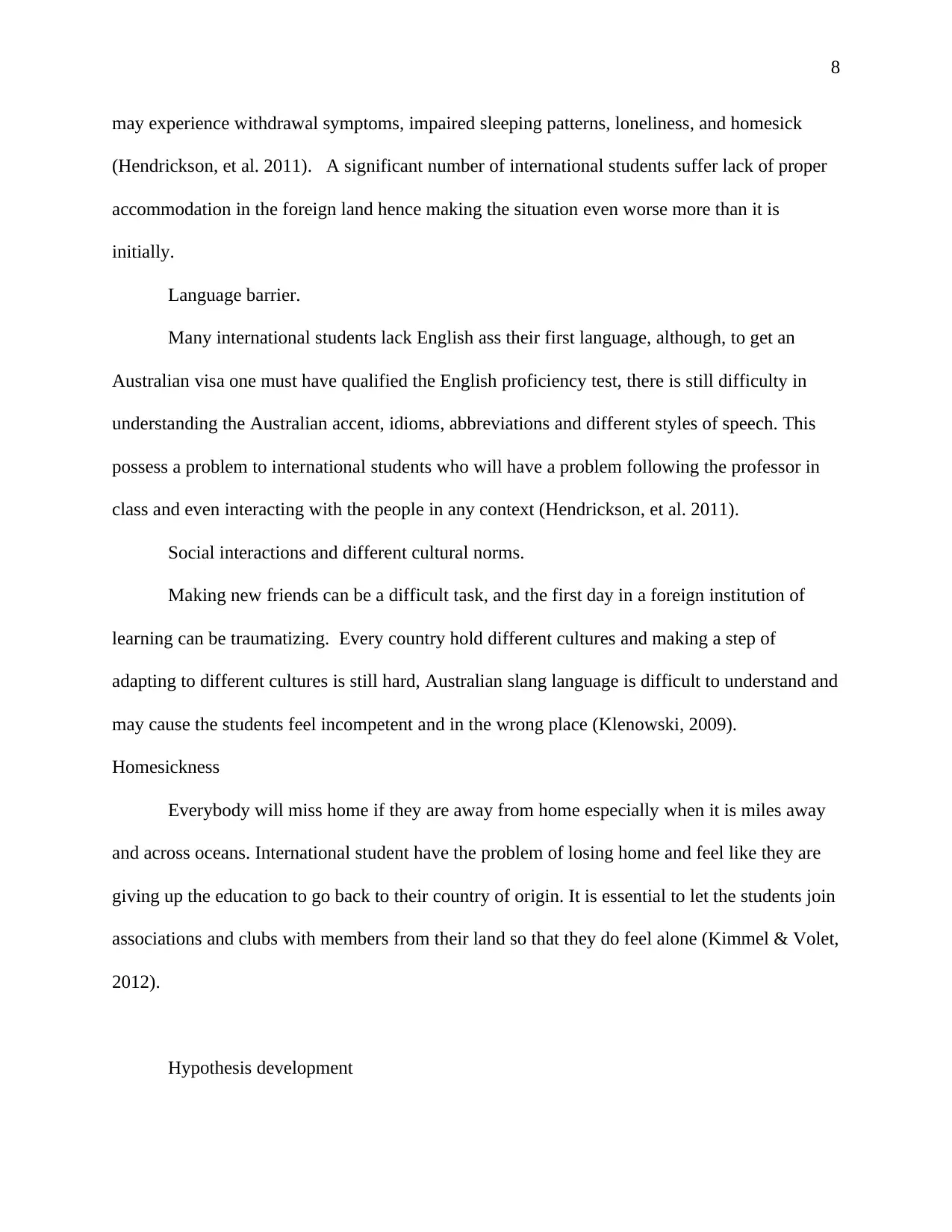
8
may experience withdrawal symptoms, impaired sleeping patterns, loneliness, and homesick
(Hendrickson, et al. 2011). A significant number of international students suffer lack of proper
accommodation in the foreign land hence making the situation even worse more than it is
initially.
Language barrier.
Many international students lack English ass their first language, although, to get an
Australian visa one must have qualified the English proficiency test, there is still difficulty in
understanding the Australian accent, idioms, abbreviations and different styles of speech. This
possess a problem to international students who will have a problem following the professor in
class and even interacting with the people in any context (Hendrickson, et al. 2011).
Social interactions and different cultural norms.
Making new friends can be a difficult task, and the first day in a foreign institution of
learning can be traumatizing. Every country hold different cultures and making a step of
adapting to different cultures is still hard, Australian slang language is difficult to understand and
may cause the students feel incompetent and in the wrong place (Klenowski, 2009).
Homesickness
Everybody will miss home if they are away from home especially when it is miles away
and across oceans. International student have the problem of losing home and feel like they are
giving up the education to go back to their country of origin. It is essential to let the students join
associations and clubs with members from their land so that they do feel alone (Kimmel & Volet,
2012).
Hypothesis development
may experience withdrawal symptoms, impaired sleeping patterns, loneliness, and homesick
(Hendrickson, et al. 2011). A significant number of international students suffer lack of proper
accommodation in the foreign land hence making the situation even worse more than it is
initially.
Language barrier.
Many international students lack English ass their first language, although, to get an
Australian visa one must have qualified the English proficiency test, there is still difficulty in
understanding the Australian accent, idioms, abbreviations and different styles of speech. This
possess a problem to international students who will have a problem following the professor in
class and even interacting with the people in any context (Hendrickson, et al. 2011).
Social interactions and different cultural norms.
Making new friends can be a difficult task, and the first day in a foreign institution of
learning can be traumatizing. Every country hold different cultures and making a step of
adapting to different cultures is still hard, Australian slang language is difficult to understand and
may cause the students feel incompetent and in the wrong place (Klenowski, 2009).
Homesickness
Everybody will miss home if they are away from home especially when it is miles away
and across oceans. International student have the problem of losing home and feel like they are
giving up the education to go back to their country of origin. It is essential to let the students join
associations and clubs with members from their land so that they do feel alone (Kimmel & Volet,
2012).
Hypothesis development
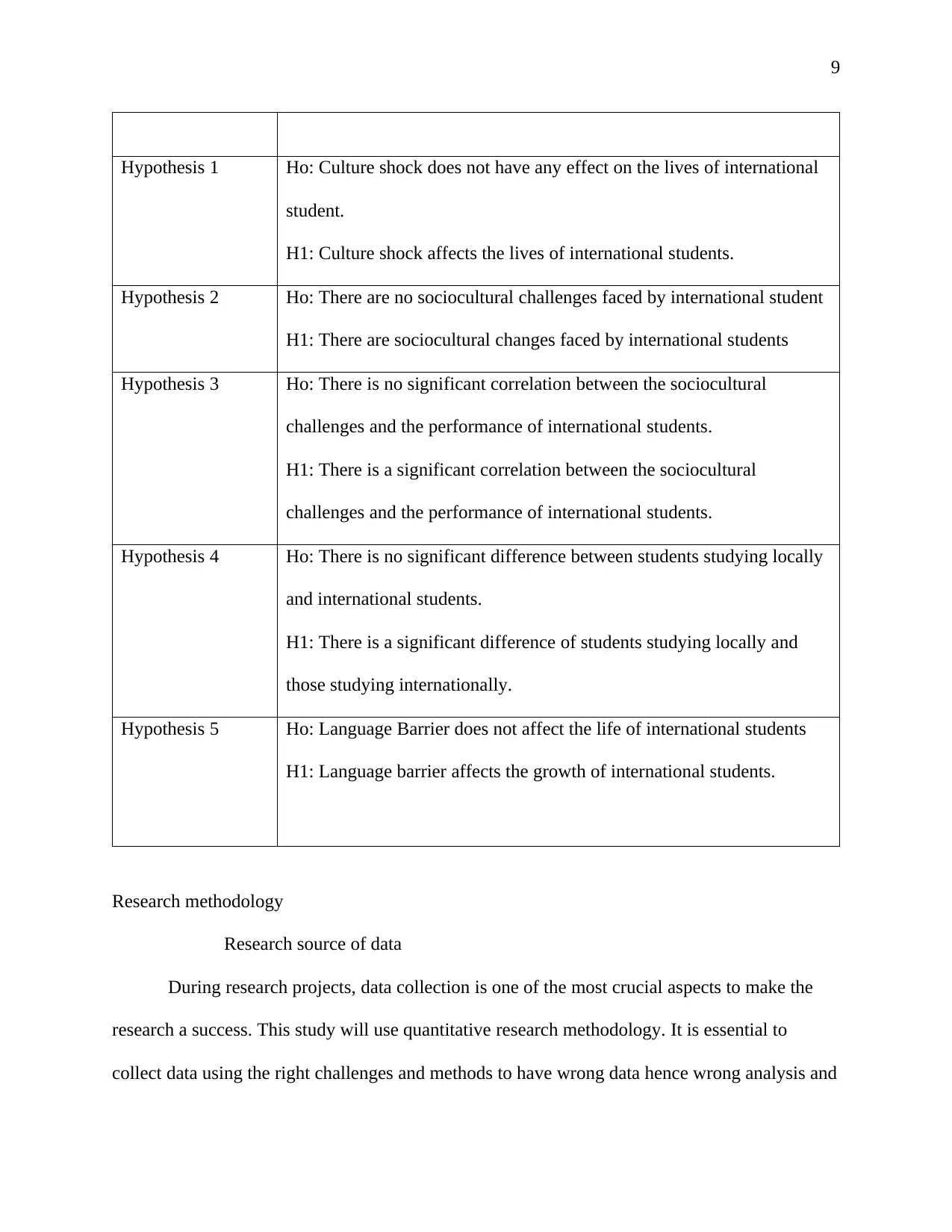
9
Hypothesis 1 Ho: Culture shock does not have any effect on the lives of international
student.
H1: Culture shock affects the lives of international students.
Hypothesis 2 Ho: There are no sociocultural challenges faced by international student
H1: There are sociocultural changes faced by international students
Hypothesis 3 Ho: There is no significant correlation between the sociocultural
challenges and the performance of international students.
H1: There is a significant correlation between the sociocultural
challenges and the performance of international students.
Hypothesis 4 Ho: There is no significant difference between students studying locally
and international students.
H1: There is a significant difference of students studying locally and
those studying internationally.
Hypothesis 5 Ho: Language Barrier does not affect the life of international students
H1: Language barrier affects the growth of international students.
Research methodology
Research source of data
During research projects, data collection is one of the most crucial aspects to make the
research a success. This study will use quantitative research methodology. It is essential to
collect data using the right challenges and methods to have wrong data hence wrong analysis and
Hypothesis 1 Ho: Culture shock does not have any effect on the lives of international
student.
H1: Culture shock affects the lives of international students.
Hypothesis 2 Ho: There are no sociocultural challenges faced by international student
H1: There are sociocultural changes faced by international students
Hypothesis 3 Ho: There is no significant correlation between the sociocultural
challenges and the performance of international students.
H1: There is a significant correlation between the sociocultural
challenges and the performance of international students.
Hypothesis 4 Ho: There is no significant difference between students studying locally
and international students.
H1: There is a significant difference of students studying locally and
those studying internationally.
Hypothesis 5 Ho: Language Barrier does not affect the life of international students
H1: Language barrier affects the growth of international students.
Research methodology
Research source of data
During research projects, data collection is one of the most crucial aspects to make the
research a success. This study will use quantitative research methodology. It is essential to
collect data using the right challenges and methods to have wrong data hence wrong analysis and
⊘ This is a preview!⊘
Do you want full access?
Subscribe today to unlock all pages.

Trusted by 1+ million students worldwide
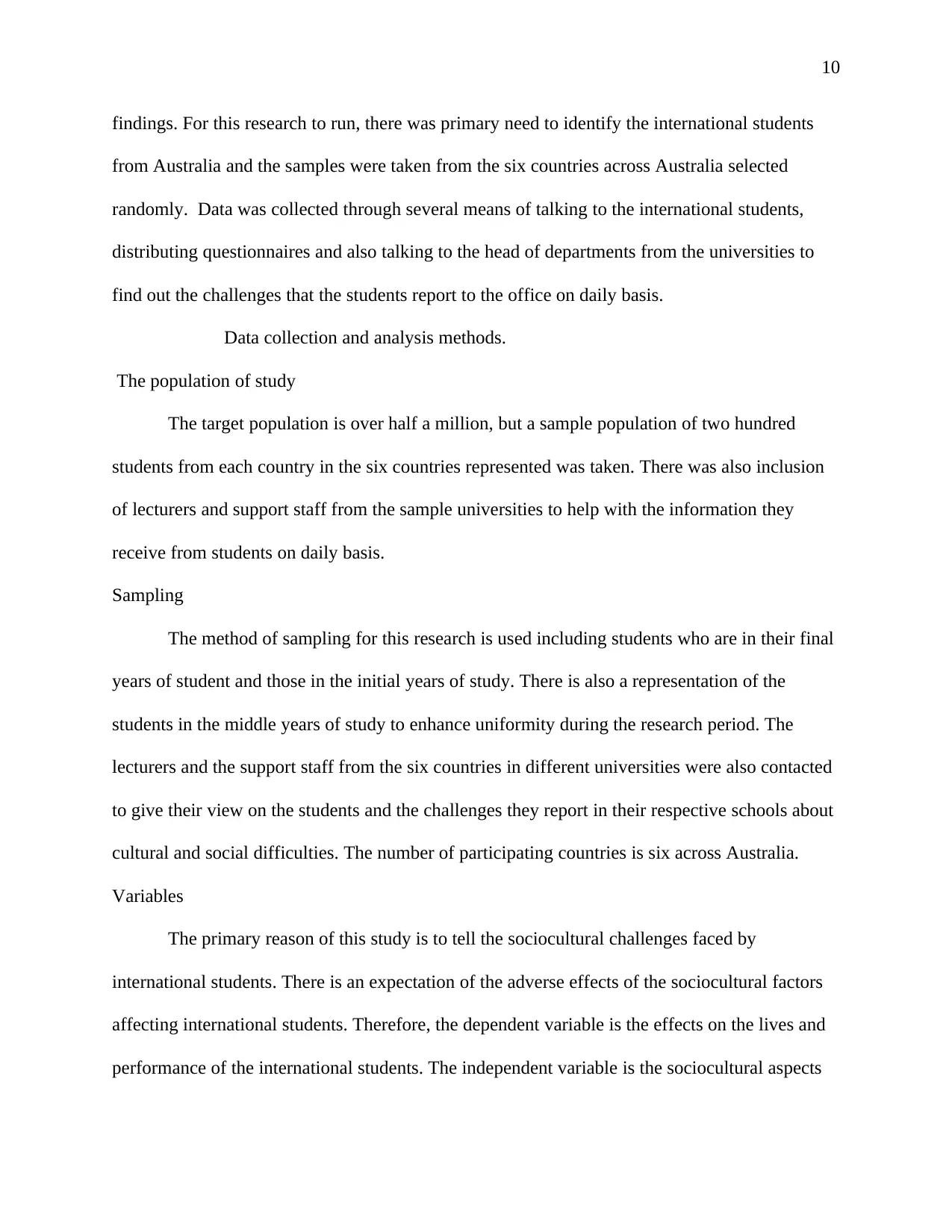
10
findings. For this research to run, there was primary need to identify the international students
from Australia and the samples were taken from the six countries across Australia selected
randomly. Data was collected through several means of talking to the international students,
distributing questionnaires and also talking to the head of departments from the universities to
find out the challenges that the students report to the office on daily basis.
Data collection and analysis methods.
The population of study
The target population is over half a million, but a sample population of two hundred
students from each country in the six countries represented was taken. There was also inclusion
of lecturers and support staff from the sample universities to help with the information they
receive from students on daily basis.
Sampling
The method of sampling for this research is used including students who are in their final
years of student and those in the initial years of study. There is also a representation of the
students in the middle years of study to enhance uniformity during the research period. The
lecturers and the support staff from the six countries in different universities were also contacted
to give their view on the students and the challenges they report in their respective schools about
cultural and social difficulties. The number of participating countries is six across Australia.
Variables
The primary reason of this study is to tell the sociocultural challenges faced by
international students. There is an expectation of the adverse effects of the sociocultural factors
affecting international students. Therefore, the dependent variable is the effects on the lives and
performance of the international students. The independent variable is the sociocultural aspects
findings. For this research to run, there was primary need to identify the international students
from Australia and the samples were taken from the six countries across Australia selected
randomly. Data was collected through several means of talking to the international students,
distributing questionnaires and also talking to the head of departments from the universities to
find out the challenges that the students report to the office on daily basis.
Data collection and analysis methods.
The population of study
The target population is over half a million, but a sample population of two hundred
students from each country in the six countries represented was taken. There was also inclusion
of lecturers and support staff from the sample universities to help with the information they
receive from students on daily basis.
Sampling
The method of sampling for this research is used including students who are in their final
years of student and those in the initial years of study. There is also a representation of the
students in the middle years of study to enhance uniformity during the research period. The
lecturers and the support staff from the six countries in different universities were also contacted
to give their view on the students and the challenges they report in their respective schools about
cultural and social difficulties. The number of participating countries is six across Australia.
Variables
The primary reason of this study is to tell the sociocultural challenges faced by
international students. There is an expectation of the adverse effects of the sociocultural factors
affecting international students. Therefore, the dependent variable is the effects on the lives and
performance of the international students. The independent variable is the sociocultural aspects
Paraphrase This Document
Need a fresh take? Get an instant paraphrase of this document with our AI Paraphraser
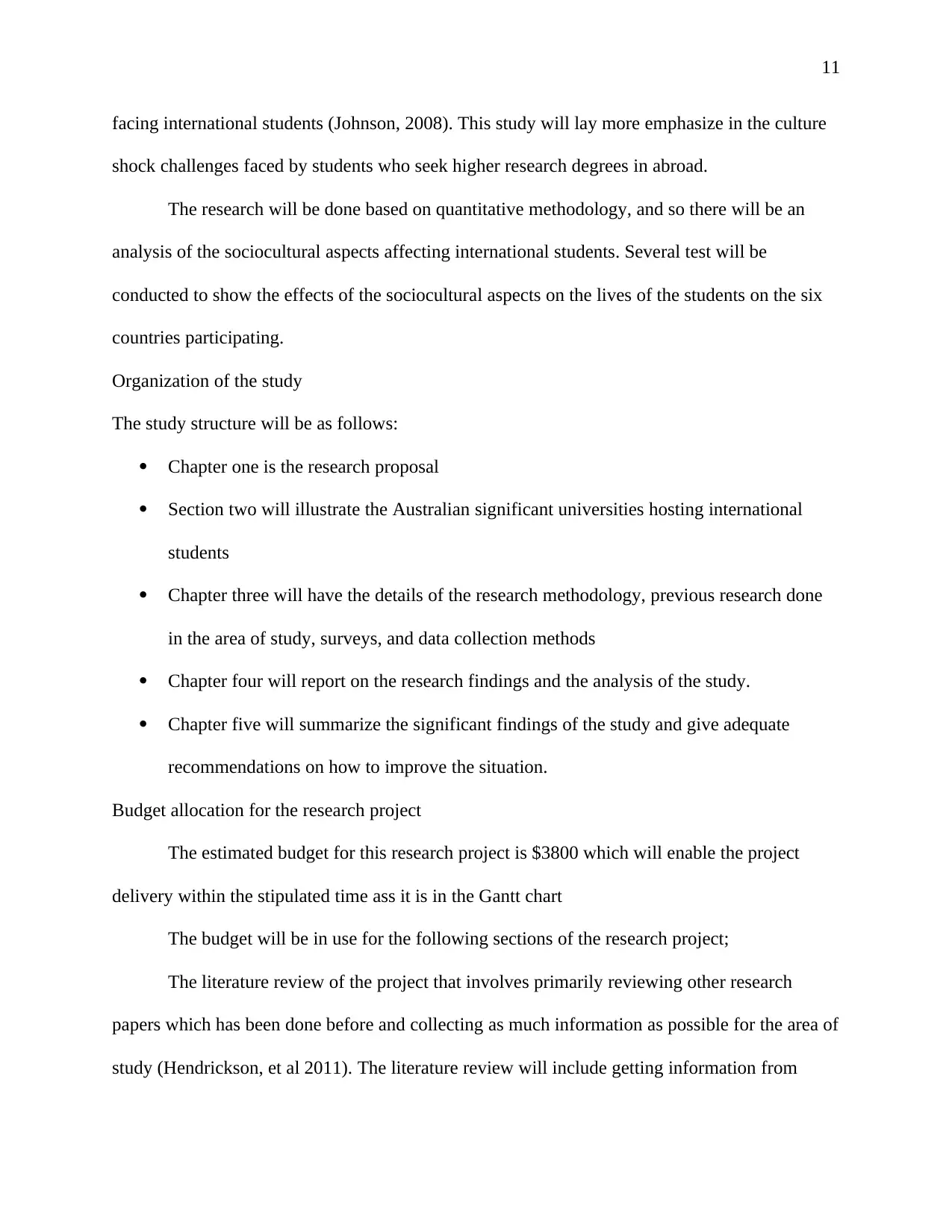
11
facing international students (Johnson, 2008). This study will lay more emphasize in the culture
shock challenges faced by students who seek higher research degrees in abroad.
The research will be done based on quantitative methodology, and so there will be an
analysis of the sociocultural aspects affecting international students. Several test will be
conducted to show the effects of the sociocultural aspects on the lives of the students on the six
countries participating.
Organization of the study
The study structure will be as follows:
Chapter one is the research proposal
Section two will illustrate the Australian significant universities hosting international
students
Chapter three will have the details of the research methodology, previous research done
in the area of study, surveys, and data collection methods
Chapter four will report on the research findings and the analysis of the study.
Chapter five will summarize the significant findings of the study and give adequate
recommendations on how to improve the situation.
Budget allocation for the research project
The estimated budget for this research project is $3800 which will enable the project
delivery within the stipulated time ass it is in the Gantt chart
The budget will be in use for the following sections of the research project;
The literature review of the project that involves primarily reviewing other research
papers which has been done before and collecting as much information as possible for the area of
study (Hendrickson, et al 2011). The literature review will include getting information from
facing international students (Johnson, 2008). This study will lay more emphasize in the culture
shock challenges faced by students who seek higher research degrees in abroad.
The research will be done based on quantitative methodology, and so there will be an
analysis of the sociocultural aspects affecting international students. Several test will be
conducted to show the effects of the sociocultural aspects on the lives of the students on the six
countries participating.
Organization of the study
The study structure will be as follows:
Chapter one is the research proposal
Section two will illustrate the Australian significant universities hosting international
students
Chapter three will have the details of the research methodology, previous research done
in the area of study, surveys, and data collection methods
Chapter four will report on the research findings and the analysis of the study.
Chapter five will summarize the significant findings of the study and give adequate
recommendations on how to improve the situation.
Budget allocation for the research project
The estimated budget for this research project is $3800 which will enable the project
delivery within the stipulated time ass it is in the Gantt chart
The budget will be in use for the following sections of the research project;
The literature review of the project that involves primarily reviewing other research
papers which has been done before and collecting as much information as possible for the area of
study (Hendrickson, et al 2011). The literature review will include getting information from
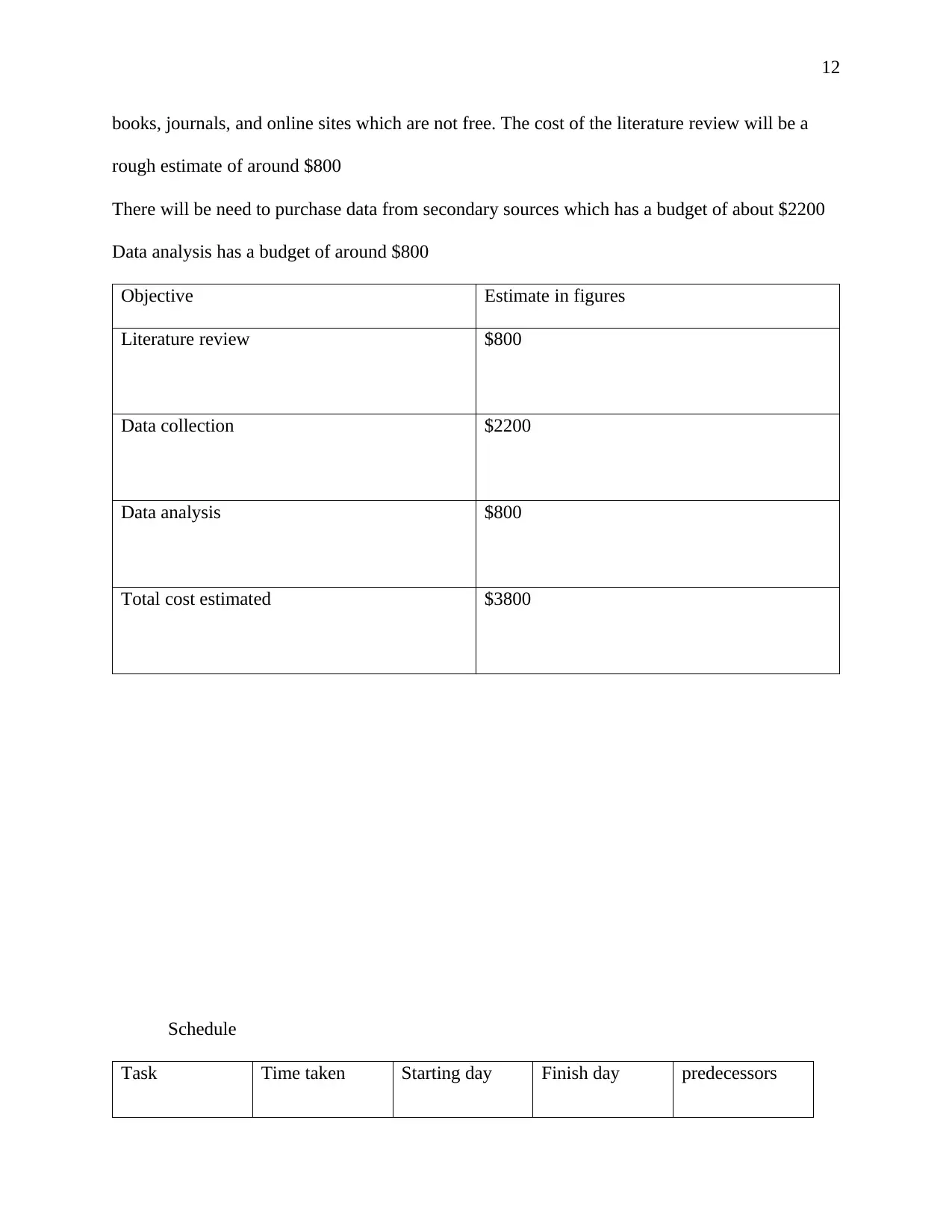
12
books, journals, and online sites which are not free. The cost of the literature review will be a
rough estimate of around $800
There will be need to purchase data from secondary sources which has a budget of about $2200
Data analysis has a budget of around $800
Objective Estimate in figures
Literature review $800
Data collection $2200
Data analysis $800
Total cost estimated $3800
Schedule
Task Time taken Starting day Finish day predecessors
books, journals, and online sites which are not free. The cost of the literature review will be a
rough estimate of around $800
There will be need to purchase data from secondary sources which has a budget of about $2200
Data analysis has a budget of around $800
Objective Estimate in figures
Literature review $800
Data collection $2200
Data analysis $800
Total cost estimated $3800
Schedule
Task Time taken Starting day Finish day predecessors
⊘ This is a preview!⊘
Do you want full access?
Subscribe today to unlock all pages.

Trusted by 1+ million students worldwide
1 out of 19
Related Documents
Your All-in-One AI-Powered Toolkit for Academic Success.
+13062052269
info@desklib.com
Available 24*7 on WhatsApp / Email
![[object Object]](/_next/static/media/star-bottom.7253800d.svg)
Unlock your academic potential
Copyright © 2020–2026 A2Z Services. All Rights Reserved. Developed and managed by ZUCOL.





